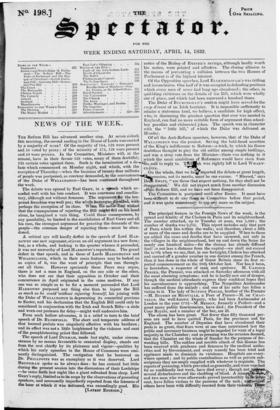NEWS OF THE WEEK.
THE Reform Bill has advanced another step. At seven o'clock this morning, the second reading in the House of Lords was carried by a majority of NINE! Of the majority of 184, 128 were present and 56 voted by proxy; of the minority of 175, 126 were present and 49 were proxies. In the Committee, Ministers will, at the utmost, have in their favour 128 votes, many of them doubtful; 126 certain votes against them. Such is the termination of a de-* bate which commenced on Monday night, and. which, with the exception of Thursday—when the business of twenty-four millions of people was postponed, as courtesy demanded, to the convenience. of the Duke of WELLINGTON—has been continued throughout the-week.
The debate was oPened by Earl GREY, in a *seat which ac- corded well with his late conduct. It was courteous and concilia- tory, although not without firmness. The argumenqor the ten- pound franchise was well put; the whale .ha*ingiclignified, with perhaps the exception of its close. When te noble:Earl wished that the consequences of rejecting the Bill might fall on his head, alone, he imagined a vain thing. Could these consequences, by any possibility, be limited to the annihilation of Earl GREY and all his race, the strongest argument for granting the demands of the peeple—the common danger of rejecting them—must be aban- doned.
A critical eye will hardly detict in the speech of Lord HAR- ROWBY one new argument, or:even an old argument in a new form; but, as a whole, and looking to the quarter whence it proceeded, it was not unworthy of Lord HARROWBY'S reputation. The grand defect in that speech, and in those of Lords HADDINGTON and WHARNCLIFFE, which in their main features may be looked on as copies of it, was the want of principle that run through- cut all three. However speciously these Peers may argue, there is not a man in England, on the one side or the other, who does not see that their opposition in October and their concurrence in April originated in the same motives. If any one was so simple as to be for a moment persuaded that Lord HARROWBY purposed any thing else than to injure the Bill -as much as he could 'without injuring himself, his joining with the Duke of WELLINGTON in deprecating its committal previous to Easter, and his declaration that the English Bill could only be considered in conjunction with the Irish and Scotch Bills—a stale and worn-out pretence for delay—might well undeceive him. From such hollow advocates, it is a relief to turn to the brief speech of Dr. BLOMFIELD. The short and temperate address of that learned prelate was singularly effective with his brethren ; and its effect was not a little heightened by the violence and cant of the pamphleteering priest that followed. The speech of Lord DURHAM, made last night, under circum- stances by no means favourable to oratorical display, stands out from the rest chiefly by its plainness and vigour—qualities by which his early speeches in the House of Commons were emi- nently distinguished. The castigation that he bestowed on Dr. Pitim.Porrs was as exemplary as it was deserved. Lord Baounuam spoke as he always does : he has entered but little baring the present session into the discussions of their Lordships —he came forth last night like a giant refreshed from sleep. Lord GREY'S reply, limited as to its scope by the observations of preceding speakers, and necessarily imperfectly reported from the lateness of the hour at which it was delivered, was exceedingly good. His [LATEST EnrrioN.,J notice of the Bishop of EXETER'S ravings, although hardly worth his notice, were pointed and effective. The closing allusion to the means of preventing a collision between the two Houses of Parliament is of the highest interest.
Of the Opposition speeches, Lord ELLENBOROUGH'S was trifling and inconclusive. One half of it was occupied in defending positions which every man of sense had long ago abandoned ; the other, in quibbling criticisms on the details of the Bill, which were wholly out of place, and which had been answered a hundred times.
The Duke of BUCKINGHAM'S oration might have served for the coup d'essai of an Irish barrister. It is impossible sufficiently to admire a statesman (and, we believe, a candidate for high office), who, in discussing the greatest question that ever was mooted in England, can find no more suitable form of argument than school- boy parodies and elaborated jokes. The speech was in character with the " little bill," of which the Duke Was delivered on Monday.
Of all the Anti-Reform speeches, however, that of the Duke of WELLINGTON was the poorest. Saving the bold-faced assertion of the King's indifference to Reform—a trick, by which his Grace doubtless thought to play the old soldier among simple lordlings, and win a stray vote from the Minister—there was nothing in it -.which 'the most atrabilious of Reformers would have risen from isseit-to reply to. Trta k was rightly left to Lord WHARN- ULTPiR.- • - • On the whole, that we ha reported the debate at great length, ccasion, not its merits, must be our excuse. "Blessed," says De Swier, "are those that expect nothing, for they shall not be *disappointed." We did not expect much from another discussion ofittie Reform Bill, and we have not been disappointed.
The committee is postponed until after Easter. It must have beenlliffrult to do any thing in Committee before that period, and it was .quite urtnecessaty to sar any more on the subject.



























